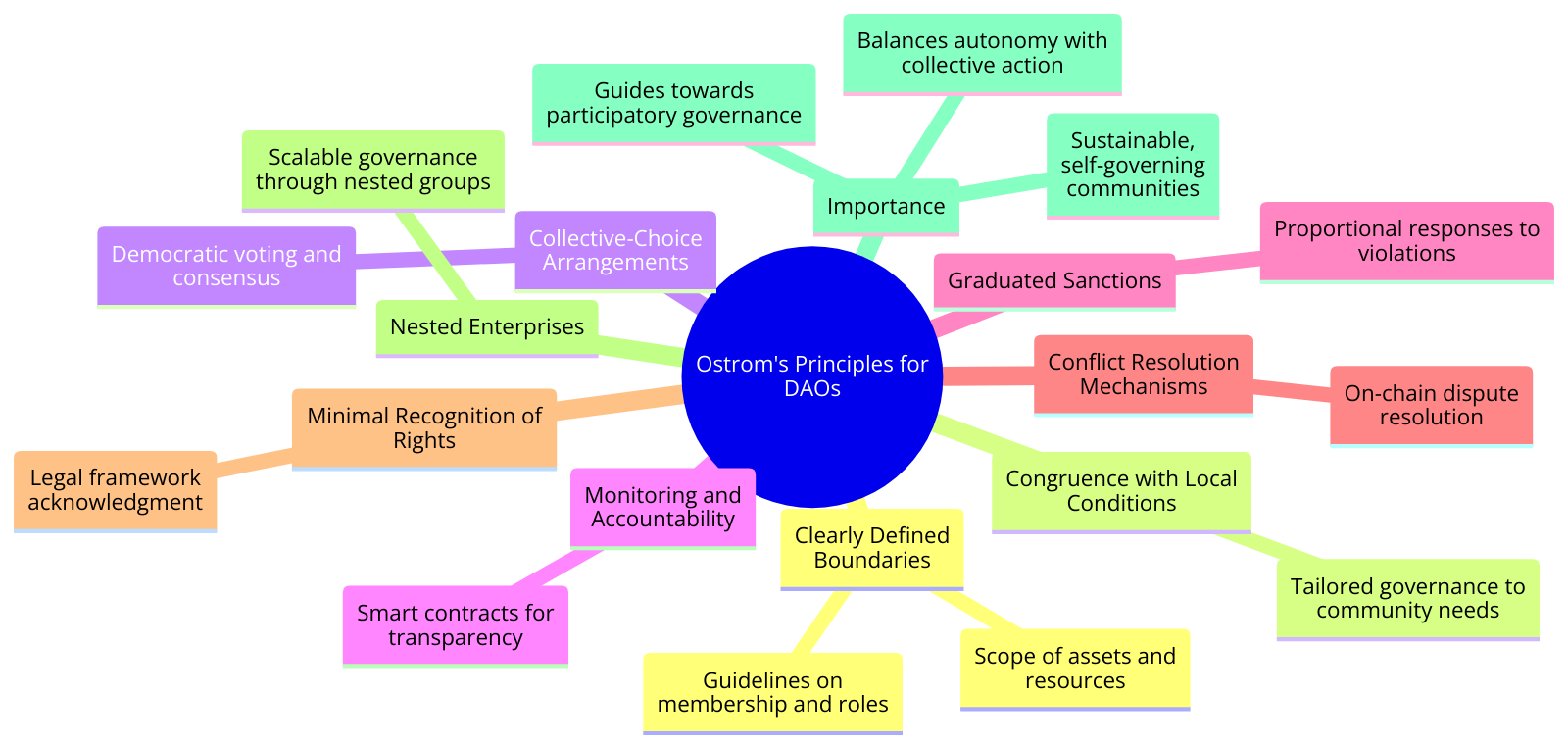In the realm of Decentralized Autonomous Organizations (DAOs), effective governance is paramount. Elinor Ostrom's eight principles for managing common-pool resources offer profound insights that can be adapted to optimize DAO governance. Ostrom's work, which earned her the Nobel Prize in Economic Sciences, provides a framework for creating sustainable, self-governing communities—principles that are remarkably applicable to the decentralized and community-driven nature of DAOs. Let's explore how these principles can guide DAOs towards more sustainable and collaborative governance models.
1. Clearly Defined Boundaries
For DAOs, this means establishing clear guidelines on membership, roles, responsibilities, and the scope of the collective's assets and resources. An example would be a DAO that specifies criteria for membership, delineates the rights and duties of members, and outlines the digital assets or resources it governs.
2. Congruence with Local Conditions
DAO governance structures and rules should be tailored to fit the community's unique characteristics, needs, and goals. A DAO focused on digital art curation might adopt different governance mechanisms than one centered around environmental conservation, reflecting the distinct contexts and objectives of each community.
3. Collective-Choice Arrangements
Members should have a say in setting the rules that govern their participation. In DAOs, this principle underscores the importance of democratic voting mechanisms and consensus models that allow members to participate in governance decisions actively.
4. Monitoring and Accountability
Effective governance requires that members or appointed moderators monitor adherence to rules and hold violators accountable. DAOs can implement smart contracts to automate monitoring and enforcement, ensuring transparency and fairness in governance.
5. Graduated Sanctions
Responses to rule violations should be proportional to the severity and context of the breach. DAOs can design tokenomic systems or reputation scores that reflect varying levels of sanctions, from warnings to temporary or permanent loss of governance rights.
6. Conflict Resolution Mechanisms
Quick, fair, and easily accessible methods for resolving disputes are crucial. DAOs can establish on-chain dispute resolution platforms or leverage existing decentralized arbitration services to address conflicts efficiently.
7. Minimal Recognition of Rights
The broader community or regulatory environment should recognize and respect the right of the DAO to self-govern. This involves legal frameworks that acknowledge DAOs as legitimate entities capable of managing their affairs autonomously.
8. Nested Enterprises
For larger DAOs, governance activities can be organized through multiple layers of nested groups, each with its governance structure. This decentralized approach enables scalability and flexibility, allowing sub-groups to manage specific aspects of the DAO's activities while aligning with the overarching governance framework.

Why Ostrom’s Principles Matter for DAOs
Adapting Ostrom's principles to DAO governance fosters more resilient, equitable, and sustainable communities. These principles guide the design of governance models that are participatory, adaptable, and aligned with the community's long-term goals. By drawing on these insights, DAOs can navigate the complexities of decentralized governance, balancing individual autonomy with collective action and ensuring the sustainable management of shared digital resources.
Incorporating Ostrom's principles into DAO governance not only honors her legacy but also pushes the boundaries of what decentralized communities can achieve. As DAOs continue to evolve, these principles serve as a roadmap for creating more democratic, efficient, and sustainable forms of collective organization in the digital age.
Join the Colony Community
Stay connected and dive deeper into the world of on-chain organizations with Colony. For the latest updates, insights, and discussions, follow us on our community channels:
- Website: Visit our website
- Twitter: Follow us on Twitter
- Discord: Join our Discord community
- Github: Find Colony on Github
Together, let's build the future of decentralized collaboration.